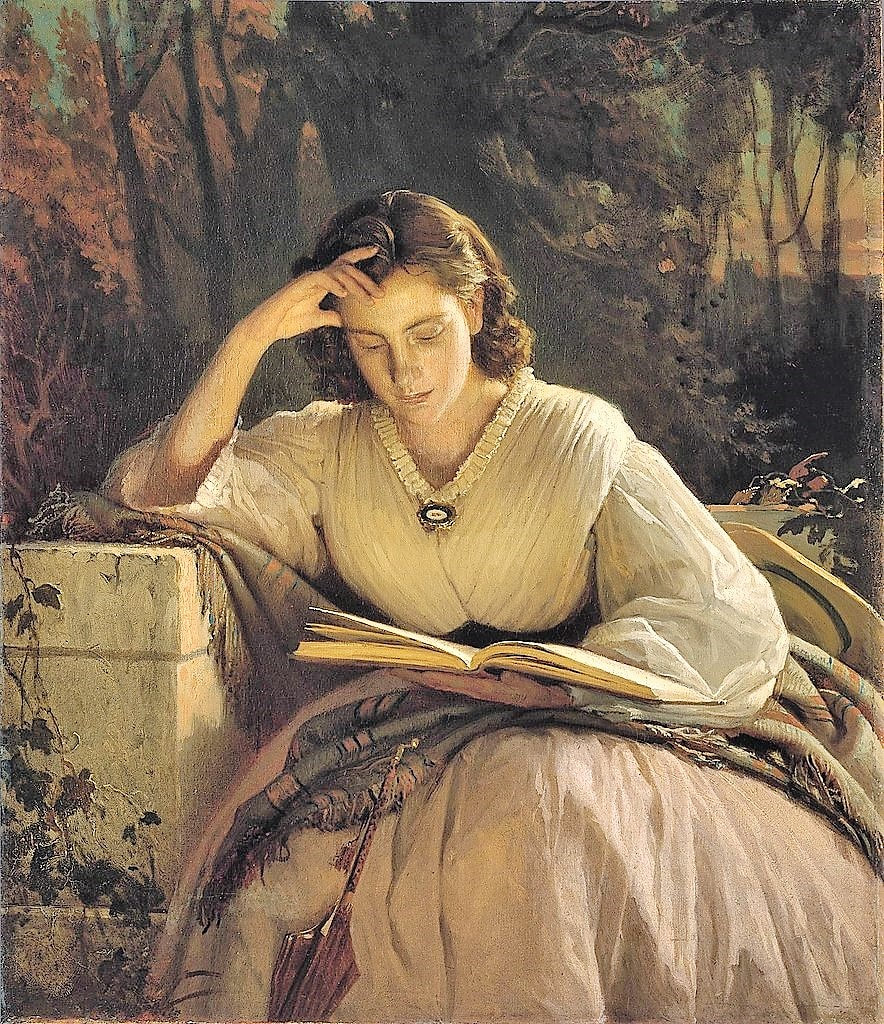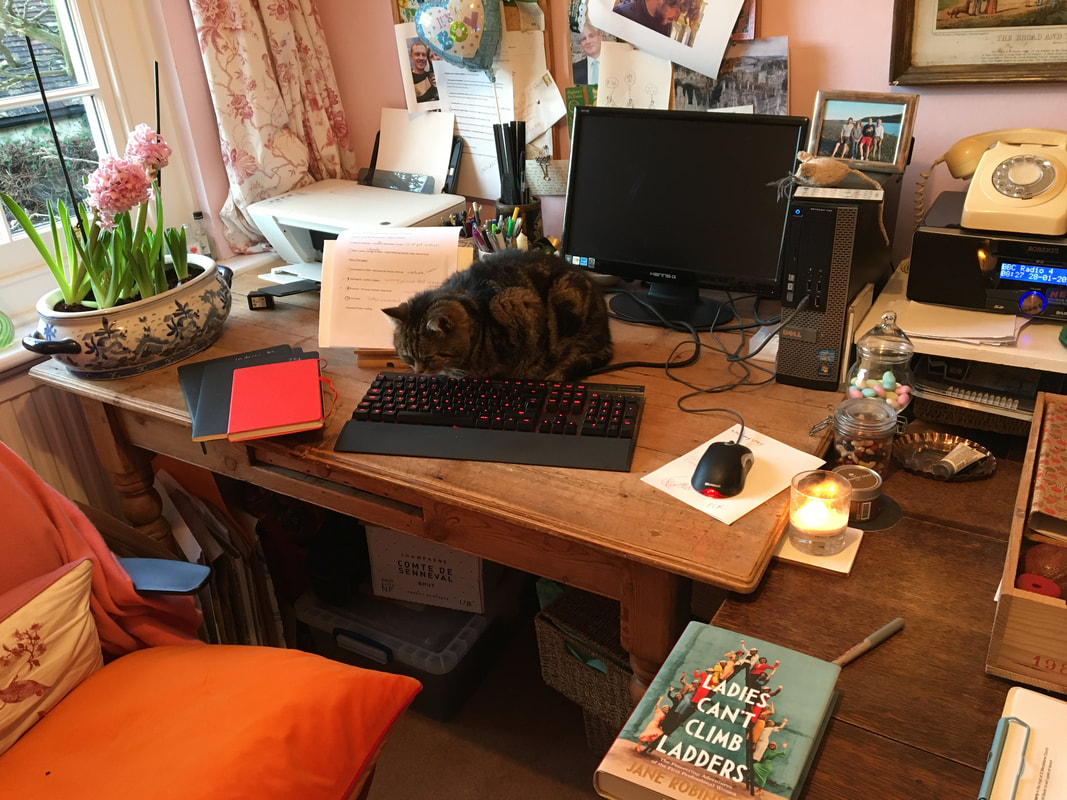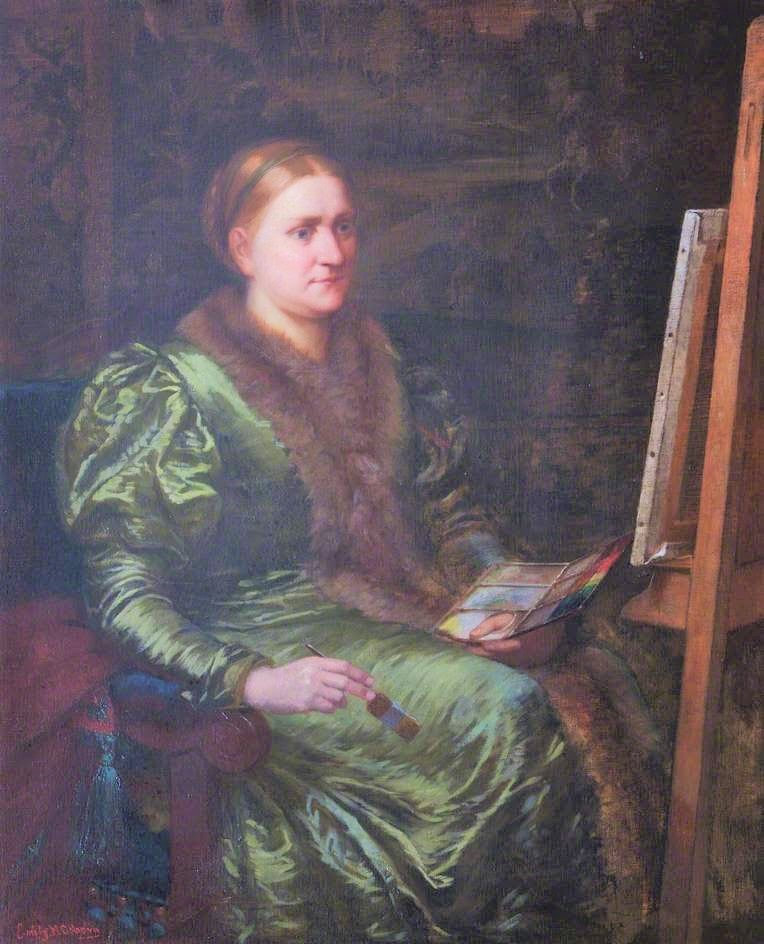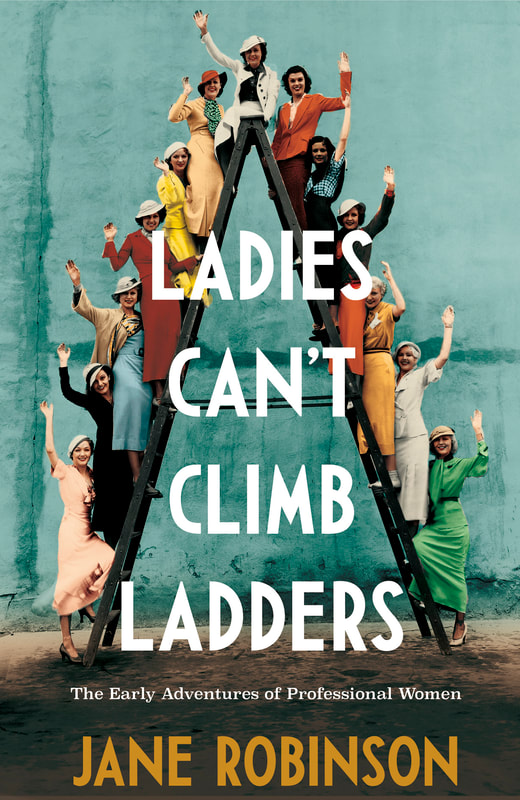Blog
A Writer's Life...
|
|

Ivan Kramskoy, Reading Woman (Wikimedia Commons)
26/3/23
My only excuse is work: since my last post, I've been catching up on lost time by working flat out on my biography of Barbara Bodichon. Now that the manuscript is finished; the title's all but decided (Trailblazer: Barbara Leigh Smith Bodichon, the Unknown Woman who Changed the World) and I've just about sorted all the picture and quotation permissions, it strikes me that you might like to hear about a book's mechanical progress from inception (conception?) to publication.
It starts, obviously, with an idea, which in my case has usually been germinating unnoticed since a previous book was written. Barbara's biography grew out of Bluestockings and Ladies Can't Climb Ladders, with heavy influence from In the Family Way. Angels of Albion, my book about the women involved in the 1857 uprising in India, sprang from Wayward Women, a biographical dictionary of women travellers - and so on.
I mention the idea to my agent, and we discuss whether she thinks it might work, both for me, my editor, and the market. If she's positive about it, I'll develop the idea into a substantial proposal while she contacts my editor to let her know I'm working on something. If any of you are interested, I've written a brief guide to producing a non-fiction proposal which I'd be happy to send you on request. In short, it explains what the book's about; why it should be published and why I'm the person to write it, together with a chapter-plan, a summary of past reviews, and a projected time-scale. Sometimes I'll write a sample chapter, too.The proposal is time-consuming but crucially important: if the editor says yes, and offers me a contract, I'll use it as a framework for writing the book.
Once a contract is agreed and signed, I'll aim to spend a year doing research, and a year writing and redrafting the book. Once it's submitted - and this is the stage I'm at now with Trailblazer - my editor will read it through and come back to me with any immediate ideas for tightening up or rejigging the odd paragraph; then it'll go off to a professional copy-editor who checks for typos and solecisms; the proof stage comes next, and then - the launch! This will be a year or so after submission of the manuscript, which means that I'll have to do a bit of revision before I start talking about it in public, to remind myself what it was all about.
Meanwhile I'll be busy on admin: checking with archives and libraries on the wording they prefer for acknowledging their material; paying for permission to reproduce illustrations and checking approval for using extracts from letters and other publications. Tedious, but very necessary.
Then - and only then - I'll begin thinking of the next book. With any luck, there in the farthest corner of my mind, I'll find a little green sprout of an idea, struggling to reach the light. In fact, I think can see one now...
26/3/23
My only excuse is work: since my last post, I've been catching up on lost time by working flat out on my biography of Barbara Bodichon. Now that the manuscript is finished; the title's all but decided (Trailblazer: Barbara Leigh Smith Bodichon, the Unknown Woman who Changed the World) and I've just about sorted all the picture and quotation permissions, it strikes me that you might like to hear about a book's mechanical progress from inception (conception?) to publication.
It starts, obviously, with an idea, which in my case has usually been germinating unnoticed since a previous book was written. Barbara's biography grew out of Bluestockings and Ladies Can't Climb Ladders, with heavy influence from In the Family Way. Angels of Albion, my book about the women involved in the 1857 uprising in India, sprang from Wayward Women, a biographical dictionary of women travellers - and so on.
I mention the idea to my agent, and we discuss whether she thinks it might work, both for me, my editor, and the market. If she's positive about it, I'll develop the idea into a substantial proposal while she contacts my editor to let her know I'm working on something. If any of you are interested, I've written a brief guide to producing a non-fiction proposal which I'd be happy to send you on request. In short, it explains what the book's about; why it should be published and why I'm the person to write it, together with a chapter-plan, a summary of past reviews, and a projected time-scale. Sometimes I'll write a sample chapter, too.The proposal is time-consuming but crucially important: if the editor says yes, and offers me a contract, I'll use it as a framework for writing the book.
Once a contract is agreed and signed, I'll aim to spend a year doing research, and a year writing and redrafting the book. Once it's submitted - and this is the stage I'm at now with Trailblazer - my editor will read it through and come back to me with any immediate ideas for tightening up or rejigging the odd paragraph; then it'll go off to a professional copy-editor who checks for typos and solecisms; the proof stage comes next, and then - the launch! This will be a year or so after submission of the manuscript, which means that I'll have to do a bit of revision before I start talking about it in public, to remind myself what it was all about.
Meanwhile I'll be busy on admin: checking with archives and libraries on the wording they prefer for acknowledging their material; paying for permission to reproduce illustrations and checking approval for using extracts from letters and other publications. Tedious, but very necessary.
Then - and only then - I'll begin thinking of the next book. With any luck, there in the farthest corner of my mind, I'll find a little green sprout of an idea, struggling to reach the light. In fact, I think can see one now...
A Change is as Good...

9/9/22
It is entirely coincidental, I promise you, that this post appears exactly two years after the last one. I'm not going to write about our personal and collective experiences of the time in between. I'm not even going to write about writing. Because now it's time for something completely different.
Every summer, my family and I design and run a pop-up Escape Room to raise money for the local Wildlife Trust. That's a poster for a past game, above. An Escape Room, in case you're unaware, is a locked-room story-puzzle for teams of people; they enter the room and are faced with a series of clues, most of which lead to keys or codes for locked boxes containing more clues; as they progress, they get nearer and nearer to completing the task which will eventually - they hope - mean they can escape within an hour. It's miles away from what we do in real life, and huge fun.
We run it on the Channel Island of Alderney, in an old German bunker - which gives plenty of scope for various adventurous scenarios. Once, we transformed the bunker into our fictional villain's submarine, complete with giant periscope and a bank of instruments with bleeps and flashing lights. Unless our punters could work out how to stop the submarine crashing into the breakwater in an hour's time, it was all over. This year, the villain returned - having completed a course in AI during lock-down - and pretended that he'd turned over a new leaf by opening a toy-shop in the bunker for Alderney's children. It turned out that the toy-shop was merely a front for a squadron of giant robots programmed to take over the island. The climax of the game was to identify and cut the correct wire in the locked control box, and therefore power down the robots and escape the room. Meanwhile, in a dark corner, a life-sized robot gradually awakened, with rolling eyes and a mean speech about conquering the world. (My husband, I should say, is a complete magician with wires and connections and things. But then, he is a surgeon... )
The design process starts around now, when we imagine a narrative for next year's Room. We try to think of satisfying clues - one year we had a spy theme, and hid parts of a Golden Gun (made of wood) around the room; when the parts were assembled it 'shot' an ultraviolet beam which when pointed at the right target, revealed the numerical code to the next locked box (which was, of course, '007'). Each game needs about 10 clues, arranged to be solved in order, with a particularly exciting - or frantic - one at the denouement.
For the rest of the year we collect bits and bobs for props, or to assemble into pieces of equipment for the clues. We've already amassed all the boxes, keys and combination locks we need. Hardly anything is new: being associated with the Wildlife Trust, the whole point of this enterprise is to use recycled or upcycled materials, mostly from the island's wonderful and ever-fruitful rubbish dump. This summer we found a fully-functional oscilloscope: one of our best props ever.
We spend a week or so setting up the game in the bunker every August, then usually have five hour-long sessions a day, for 7 or 8 days in a row. We allow half-an-hour between sessions to reset the room for the next team. Some players are families; some are work colleagues; some holiday-makers: all ages are welcome. That means we need a good mixture of problem-solving opportunities, so that everyone can join in. And unlike commercial Escape Rooms, we constantly monitor every game via camera and laptop so that we can help the players along a little if they need it. Our aim is for everyone to 'escape' with only minutes or seconds to spare, having thoroughly enjoyed themselves and feeling proud that they have saved the island and themselves from certain doom.
Watching team dynamics as people play is fascinating. The more they invest in the narrative, the more single-minded they become. Their joy at solving a particularly tricky puzzle - of 'getting it' - is really infectious. And we raise lots of money for the Trust. I love it.
It's hugely valuable to switch off from the day-job and do something completely different once in a while. For two or three weeks every summer I'm completely immersed in our villain and his dastardly doings; I don't have the time to think about writing. And when it's all over, I'm more than ready to get back down to real work. That's what I'm doing now. But there's always a little part of my brain on the qui vive, looking for wicked clues or a baffling piece of kit for next year's Room...
9/9/2020
Wild Barbara
I'd like to tell you a little bit about the subject of a major biography I'm working on at the minute. Regular readers will recognise her: Barbara Leigh Smith Bodichon has cropped up cheerfully throughout my career. Now I have a chance to explore just what an unusual and influential woman she was. The portrait below, by Emily Osborn, does her no particular favours, but I think you get a sense of her strength of spirit. She called herself 'wild', 'one of the cracked people of the world', on a life-long quest for truth, beauty and most of all, for justice.
Wild Barbara
I'd like to tell you a little bit about the subject of a major biography I'm working on at the minute. Regular readers will recognise her: Barbara Leigh Smith Bodichon has cropped up cheerfully throughout my career. Now I have a chance to explore just what an unusual and influential woman she was. The portrait below, by Emily Osborn, does her no particular favours, but I think you get a sense of her strength of spirit. She called herself 'wild', 'one of the cracked people of the world', on a life-long quest for truth, beauty and most of all, for justice.
I can reel off plenty of interesting facts about her: she was illegitimate (which is why her cousin Florence Nightingale refused to acknowledge her); independently wealthy; a professional water-colourist; an intrepid traveller; was involved in founding the first women's suffrage society and the first university college for women in England (Girton, Cambridge); changed the legislation preventing married women from owning their own property; campaigned for women to be allowed into the professions; opened one of the country's first co-educational schools for inner-city children; refused to wear stays; lived half the year with her eccentric French husband in Algeria, etc. etc..
But what really sets her story apart is love. She was at the centre of an adoring and eclectic circle of friends, including George Eliot, the Brownings, John Chapman, Dante Gabriel Rossetti, Christina Rossetti, Lizzie Siddal, Gertrude Jekyll, Dr Elizabeth Blackwell, Millicent Fawcett - and so on and so on. All of them described Barbara as warm-hearted - 'lion-hearted', even; boundlessly generous, and kind.
Those were her celebrity friends; countless working-class people had Barbara to thank for education, physical well-being, financial and moral support. Barbara was a phenomenon; the most modern woman of the Victorian age, and I cannot wait to tell her story.
But what really sets her story apart is love. She was at the centre of an adoring and eclectic circle of friends, including George Eliot, the Brownings, John Chapman, Dante Gabriel Rossetti, Christina Rossetti, Lizzie Siddal, Gertrude Jekyll, Dr Elizabeth Blackwell, Millicent Fawcett - and so on and so on. All of them described Barbara as warm-hearted - 'lion-hearted', even; boundlessly generous, and kind.
Those were her celebrity friends; countless working-class people had Barbara to thank for education, physical well-being, financial and moral support. Barbara was a phenomenon; the most modern woman of the Victorian age, and I cannot wait to tell her story.
In other news: I'm incredibly honoured to have been invited by the Hawthornden Trust to spend time in Italy working on the Bodichon biography. This is not a tranquil time for any of us, and I must admit I'm apprehensive about the journey, having hardly left home for six months, but it's such a privilege. I can't say no to the opportunity for peace, quiet, and writerly sympathy. Bring it on.
Soon after my return in October, a documentary about Mary Seacole is due to be aired by ITV. I spent a morning filming with the incomparable Alison Hammond and am much looking forward to the result. I'll let you know the date on Twitter.
And finally, Captain Oates sends his love. He has spent lockdown doing an awful lot of thinking, and is therefore having a(nother) quick snooze, otherwise he'd be here at our desk as usual. Sweet dreams.
Soon after my return in October, a documentary about Mary Seacole is due to be aired by ITV. I spent a morning filming with the incomparable Alison Hammond and am much looking forward to the result. I'll let you know the date on Twitter.
And finally, Captain Oates sends his love. He has spent lockdown doing an awful lot of thinking, and is therefore having a(nother) quick snooze, otherwise he'd be here at our desk as usual. Sweet dreams.



